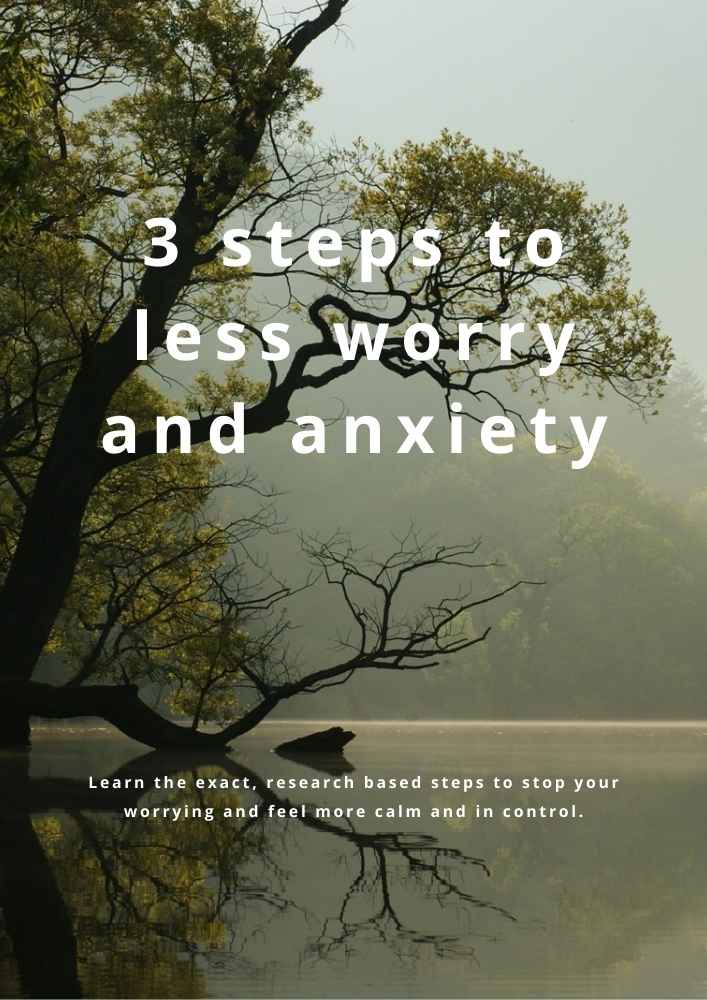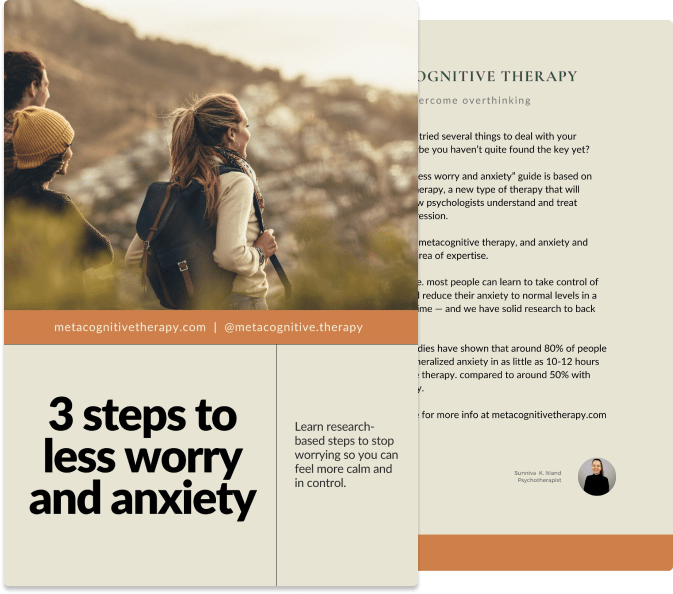Anxiety symptoms don't need to stress you out. Here's how to handle them

Download our best tips on reducing anxiety and worrying
Learn three powerful metacognitive therapy steps to stop the worry cycle, reduce anxiety, and feel calmer in everyday life.
.jpeg)
.jpeg)
Have you ever experienced your heart racing, brain fog or dizziness, sudden nausea, sweatiness, or hyperventilating? These are typical anxiety symptoms that many people have felt.
While these symptoms can be distressing, the physical reactions that can happen in your body when you're anxious are completely normal, and they serve a purpose.
The purpose of anxiety
Why do we have anxiety? To explain this, we first need to distinguish between anxiety as a feeling and anxiety as a disorder. While an anxiety disorder isn't actually helpful in any way, the common feeling of anxiety, and the bodily reactions that come with it, are helpful, normal, and necessary for us as individuals and as a species.
The anxiety response is your body's natural alarm reaction, which includes a physical response that has evolved over millions of years to keep you alive.
When your brain perceives something as dangerous, whether it's a real threat or just a thought, it sounds the alarm. Then, what we often call the 'fight, flight, freeze' response kicks in, quickly mobilizing extra strength so you can increase your chances of survival.
This is very useful in some situations: Imagine our ancestors encountered a saber-toothed tiger. Those with the strongest alarm reaction ran fastest, survived, and went on to have children. That's why we still have a strong anxiety response… those who didn't have it, didn't survive.
You can think of the anxiety response as a kind of fire alarm. It's better that it warns once too often than once too little, and even though it's stressful when the alarm goes off, the alarm itself isn't harmful.
Common anxiety symptoms and what they mean
When the alarm goes off, a lot happens in a short time, as the brain releases adrenaline which sets off a chain reaction throughout the body.
Here are the most common physical symptoms of anxiety:
- Heart palpitations and increased pulse: Your pulse increases and your heart beats harder to pump oxygen-rich blood to the large muscles in your arms and legs.
- Hyperventilation and breathing difficulties: Your body signals that it needs more oxygen to be ready to fight or flee. This makes you breathe faster and deeper, but since you're not actually running or fighting, you take in more oxygen than your body needs. This can lead to symptoms like dizziness, tingling in fingers and toes, and the feeling of not being able to breathe, despite your body actually having more than enough oxygen.
- Nausea and stomach problems: Your body draws blood away from areas that aren't critical for survival — like the digestive system. That's why you might feel nauseous or queasy, or get diarrhea when you have anxiety.
- Cold hands and feet: Blood is drawn away from fingers and toes, which is why many people get cold hands when they experience anxiety.
- Muscle tension: The large muscle groups tense up and become ready for use. Tension in the stomach area, combined with adrenaline, can create the feeling of having 'a stone in your stomach.'
- Sweating: Your body prepares for physical exertion and begins to sweat to regulate temperature.
- Vision disturbances: Your pupils dilate to let in more light and information. This can make you experience vision changes like spots or tunnel vision.
- Dizziness: Increased pulse, increased breathing rate, and redistribution of blood can make you feel dizzy.

Download our best tips on reducing anxiety and worrying
Learn three powerful metacognitive therapy steps to stop the worry cycle, reduce anxiety, and feel calmer in everyday life.
Why do you get anxiety symptoms from thoughts?
Your brain can't always distinguish between a real and an imagined threat. Worries and negative thoughts can trigger exactly the same anxiety symptoms you would get if you met a bear in the forest.
Anxiety symptoms can therefore be triggered by:
- Thoughts about future events (for ex: thoughts about giving a speech).
- Thoughts about anxiety itself (worries about having another panic attack, or about going crazy from anxiety).
- Worries about others (a thought about someone you care about getting into an accident).
In all these cases, your body reacts with anxiety and physical symptoms as if the danger were real and present right now. But that doesn't mean the threat is present, or that you should react as if it is.
Developing anxiety about anxiety
Many people worry about their anxiety, but can it actually harm you physically?
Anxiety might not be as dangerous as it's made to seem, but worrying that it's dangerous causes more stress and hypervigilance. Just like you wouldn't install a smoke detector that burns down your house when it goes off, it wouldn't make sense if the anxiety response—developed over millions of years to keep you alive—would seriously harm you.
Many people are scared of going crazy from anxiety, but anxiety is not a risk factor for psychosis.
Consider how many people experience anxiety during a day or week, and how many develop an anxiety disorder during their lifetime. Anxious feelings are incredibly common. But how many actually go crazy from anxiety? In our clinic, we meet people struggling with anxiety disorders daily. Some have severe anxiety, and some have struggled with it for years. Yet we have never met a single person who has 'gone crazy' from anxiety.
Intense anxiety symptoms can feel so overwhelming that you might fear losing control, especially during a panic attack, but these are temporary feelings that pass on their own.
What often adds to the fear of 'going crazy' is excessively worrying and monitoring your own thoughts and feelings, which might be what maintained your anxiety in the first place.
Can you faint from anxiety?
Most people will not faint from anxiety. In fact, anxiety could help protect you against fainting.
During an anxiety reaction, blood pressure actually increases, while fainting occurs if blood pressure drops rapidly. Therefore, you're actually further from fainting when you have anxiety than when you don't have anxiety, even though it doesn't feel that way.
An exception to this is blood and needle phobia, which are the only types of anxiety/phobia where blood pressure drops instead of rising. There's also a small population of people who are prone to fainting, who can faint from anxiety.
How to handle anxiety symptoms
When you understand that anxiety isn't dangerous, there actually isn't much you need to do to handle it. Anxiety regulates itself.
Imagine you're in a spin class. When you pedal fast and hard, your pulse goes up, but when you stop spinning, your pulse doesn't immediately fall back to normal. It takes some time to regulate itself, but it always does, and it happens completely on its own. You don't need to do anything to bring your pulse down.
It's the same with anxiety and anxiety symptoms. The anxiety response is energy-intensive, and therefore your body will always return to a calm state by itself as soon as it can, without you needing to do anything to make it happen. It simply can't maintain strong anxiety over time, in the same way that you can only manage to spin for a certain amount of time before you have to slow down the pace.
The problem arises when we continue to 'spin' mentally, by constantly returning to scary thoughts or trying to control our symptoms. This continues to set off our anxiety response, maintaining it over longer periods.
Letting your anxiety pass on its own is the best thing you can do. Continue with what you're doing in your day, and let anxiety regulate itself.
What you should do instead
The next time anxiety shows up, try this:
Notice the feeling without trying to suppress it: Instead of fighting against it, you can recognize the symptoms and remind yourself that they're completely normal.
Shift your attention back to what you were doing: Don't hyperfocus on, or start monitoring anxiety symptoms. Just go back to what you were doing before you felt the symptoms, or do what you had planned: Call a friend, cook, clean, take a walk, or watch a show. You can still do all of those things, even if you have symptoms in the background.
Let anxiety regulate itself
When you stop fighting against anxiety and anxiety symptoms, and instead continue your day, focusing on what you would normally focus on, your body will eventually regulate the symptoms by itself, just like your pulse after a spin class. This won't necessarily feel easy to begin with, but give it a chance and see what happens… you might surprise yourself.
Research shows that negative thoughts and anxiety symptoms are short-lived and pass on their own if we stop interfering. Many people experience serious improvement just by following this advice, but if you're still struggling with anxiety about anxiety, or about certain anxiety symptoms, we recommend booking an appointment with a trained MCT-therapist.
Metacognitive therapy is an effective treatment for anxiety, and most people experience great improvement or become completely well within 8-12 sessions. Read more about us and book an appointment here.



